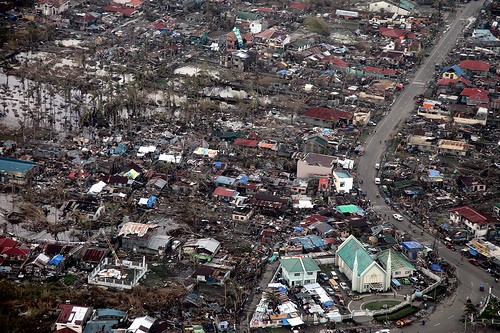Workshop on Community Resilience and Human Security:
From Complex Humanitarian Emergencies to Sustainable Peace and Development
Date: 10–11 April 2014
Venue: Holiday Inn Singapore Atrium
Organised by: RSIS Centre for NTS Studies
| |
 |
|
Credit: Flickr/Russell Watkins, Department for International Development
Disasters such as the one wrought by Typhoon Haiyan compound humanitarian and development challenges for many vulnerable cities in the region.
|
Critical infrastructure (such as public utilities, transport, water and health systems) is a central function of development and human security, particularly in ensuring the basic needs and welfare of communities. However, the provision of such infrastructure in many developing countries is often concentrated in affluent metropolitan areas and tends to have limited benefits for poor and vulnerable urban communities in terms of improving their quality of life. Amid vulnerabilities to climate change and internal socio-political challenges, achieving equity among urban communities thus presents a vital challenge to many city governments in Southeast Asia.
This Workshop on Community Resilience and Human Security: From Complex Humanitarian Emergencies to Sustainable Peace and Development was significant in the Centre’s work for two reasons. First, it built on the recommendations of the Expert Working Group Meeting on Advancing Urban Resilience in the face of Environmental Change in April 2013. The meeting concluded that ‘building resilience should be centred on attaining human and collective security’ by ‘helping individuals, communities, cities and states adapt to environmental changes in urban spheres (RSIS Centre for NTS Studies 2013).’ Secondly, 2014 marks the 20th anniversary of the introduction of human security in policy and practice. The workshop thus provided a timely opportunity to take stock of the extent to which human security has been mainstreamed and at the same time explored ideas relating to community resilience in the context of complex humanitarian emergencies brought about by geological and weather-related disasters and conflict, as well as long-term peace and development.
This workshop sought to shed light on community-based initiatives in metropolitan Asian cities and formulate recommendations to address difficulties in upscaling or mainstreaming such initiatives for the benefit of a broader section of a metropolitan society. Specifically, it aimed to:
(1) discuss ways to enhance resilience through community-based initiatives
(2) explore ways in which community resilience contributes to human security
(3) examine the dynamics of community resilience in complex humanitarian emergencies (conflicts and disasters)
(4) explore community initiatives that can contribute to long-term sustainable peace and development
Speakers and participants included representatives from relevant Singapore ministries, academics from the natural and social sciences, as well as NGOs working with local communities in Asian cities.
Click here for the programme.
Opening Session:
Sofiah Jamil, RSIS Centre for Non-Traditional Security (NTS) Studies
Setting the Context: Community resilience and human security
Session 1: Housing Infrastructure and Urban Planning
Nattawut Usavagovitwong, Center for Integrated Socio-Spatial Research
Housing by People in Thailand: From National Policy to Empowerment
Arlene Christy Lusterio, TAO-Pilipinas, Inc.
Promoting Community-based Initiatives toward Secure and Safe Settlements in Metro Manila
Tommy Firman, Djoko Suroso and Ibnu Sofian, Institute of Technology, Bandung
Climate change-related vulnerabilities in large cities in Java’s North Coast region: Implication for urban development planning
Session 2: Transportation Systems and Infrastructure: Accessibility and Movement
Katja Schechtner, Asian Development Bank
Mainstreaming Universal Access‑Making Transport Inclusive
Lynette Cheah, Singapore University of Technology and Design
Adaptive urban transportation
Kem Monovithya, Cambodia National Rescue Party
Transport Sector: The Cambodia case
Session 3: Public Utilities and Services: Urban Governance and Community Adaptation
Devanathan Parthasarathy, South Asian Studies Programme, National University of Singapore
Informal resilience, informal sector and disaster governance in Mumbai
Bharat Dahiya, Chulalongkorn University, Thailand
Empowering Local Communities for Climate Change Adaptation: Lessons from Evolving Urban Governance in Ulaanbaatar
John Taylor, Yayasan Kota Kita
Harnessing crowd-sourced urban data gathering and making information accessible to improve public services and promote community resilience
Session 4: Health systems in disaster and conflict situations
Mubariz Tariq, International Committee of the Red Cross
Health challenges during conflict and disaster situation
Rahmawati Husein, Muhammadiyah Disaster Management Center
The Role of Muhammadiyah in disaster and conflict in Indonesia
Allen Lai, Institute of Health Economics and Management, ESSEC Business School (Asia Pacific)
Organizational capacity and health security: Evidence from fighting Influenza A H1N1 Pandemics in 2009
Session 5: Information and Communication: Raising Awareness and Communicating Risk
Rose Mary, Karuna Myanmar Social Services
Resilience starts at HOME
Ari Mochamad, Adaptation Working Group, National Council on Climate Change
Current efforts on climate change adaptation at various levels in Indonesia
Ramji Neupane, International Alert, Nepal
Community security and justice work in Nepal: Public security perspective and responses
Session 6: Cooperation and Collaboration: Way forward for regional frameworks and strategies
Danny Lee, ASEAN Secretariat
The ASEAN Community
Catherine Diomampo, ICLEI Southeast Asia
ICLEI Southeast Asia: Towards building resilience in the region
Sasank Vemuri, Cities Development Initiative for Asia
Alleging Expectations across Institutions: Finding real world solutions for collaboration among organizations with differing operational logics
Posted on: 10/4/2014 8:00:00 AM |
Topic: Climate Change, Environmental Security and Natural Disasters / Other NTS Issues


